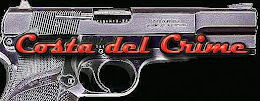Michael Anthony Nelson created a fake bank in Florida and stole more than $700,000 in loans.
1999, Michael Anthony Nelson created a fake bank in Florida and stole more than $700,000 in loans. Let out five years later on federal probation, he headed north to Chicago, where he created a consulting firm, convinced people that he had friends in high places and allegedly conned hundreds of thousands of dollars out of small businesses and churches.He went back behind bars, but only for a few months - and when he got out, federal authorities say, he stole the identity of a New York lawyer, hired employees for a bogus law firm and ripped off victims in the Bay Area for about $35,000 for legal services he didn't actually provide. The attorney whose identity he allegedly stole, Michael Scot Nelson, was admitted to the State Bar of California in 1995 and works as an attorney for the Federal Reserve Bank in New York. Michael Anthony Nelson, 38, of Orlando, on the other hand, has never been an attorney anywhere in the United States. What he's been, prosecutors say, is a con man from coast to coast.On Thursday, a federal grand jury in San Francisco indicted Nelson on charges of mail fraud, wire fraud, computer fraud and aggravated identity theft for allegedly hijacking the New York attorney's good name.
The charges date back to January 2006, in between stints behind bars, when Nelson created what prosecutors say was a bogus law firm, Nelson & Associates. He rented office space in Atlanta and Los Angeles and applied for credit card accounts by using the name of an actual law firm in Seattle, prosecutors said.The firm's founder and senior partner is yet another Michael Nelson, this one Michael Edward Nelson."I'm glad they caught him," that Michael Nelson said Friday. "It's a con."Michael Anthony Nelson hired attorneys and clerical help for his law offices, and recited for clients information about himself that actually belonged to Michael Scot Nelson, which he found online, prosecutors said. He even allegedly hacked the State Bar's Web site, reactivated Michael Scot Nelson's status as a practicing attorney in California - it had lapsed when Michael S. Nelson went to New York - and began trolling online sites for clients.In March 2006, he responded to a San Francisco woman identified in court papers only as C.M., who had posted a request for a real estate attorney on Craigslist, the indictment said. He allegedly scammed a $4,000 retainer from her.The next month, Nelson accepted a retainer payment and $30,000 from a man, identified only as R.K. of Belmont, who posted a request on a Web site called LegalMatch for an attorney to help him with a business dispute, authorities said. Nelson told R.K. that the money would be held in escrow as part of a lawsuit settlement, the indictment said.Diane Curtis, spokeswoman for the State Bar, said Friday that officials still don't know exactly how Michael Anthony Nelson could have stolen Michael Scot Nelson's identity. An outside auditor reviewed the organization's procedures, she said."It hasn't happened before, and it hasn't happened since," Curtis said.There's nothing to suggest Nelson ever actually appeared in court as an attorney, but he's been there many times as a defendant.In 1999, Nelson was convicted of wire fraud for creating a bogus bank in Florida to steal more than $723,000 in loans. It so happened that one of his attorneys was named Michael Nielsen.
That same year, Nelson was sentenced in federal court in Texas to a year in prison for misusing a Social Security number.After being released, Nelson surfaced in Chicago in 2004, where he allegedly posed as Dr. Anthony Zamora, the founder and chairman of the board of Cano Publishing Co., which purportedly provided consulting services. He convinced clients, many of them small businesses and churches, that he could do great things for them through his political and business connections, if they would sign on with him.Federal prosecutors in Chicago have accused Nelson of bilking two churches of at least $400,000. The churches believed that Nelson would help them with local redevelopment or construction projects, but he used the money instead to fund Cano, authorities said. He's also accused of writing bad checks and defrauding several banks."It's just almost devastating," Pastor George Henderson of the Greater Garfield Park Church in Chicago told a local TV station, WBBM, in 2005. "I'm really, really upset and I'm ashamed."About the time the allegations began surfacing, Nelson was sent to prison for violating the terms of his release in the Florida case. He was released in December 2005, less than two weeks before a federal grand jury in Chicago indicted him in the case there. By January 2006, Nelson had already started plotting his scheme in California, authorities said.He was arrested in Los Angeles in April 2006, and he has remained in federal custody in Chicago ever since. The San Francisco investigation began after his arrest.From his jail cell in Chicago in 2007, Nelson offered a local credit-counseling organization a free monthly newsletter that would warn people how to avoid having their identity stolen. Nelson later submitted the letter to court as evidence of his good character."I'm here to educate potential victims, consumers, families and businesses on how to identify the con, deception or potential fraud," Nelson wrote. "I have learned how to turn my past negative life into something that can be used as a positive vehicle that can help and save people."







